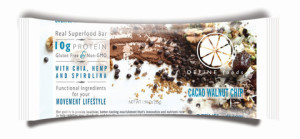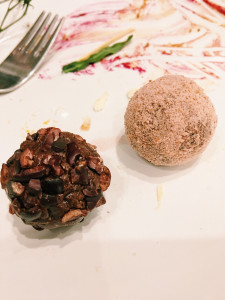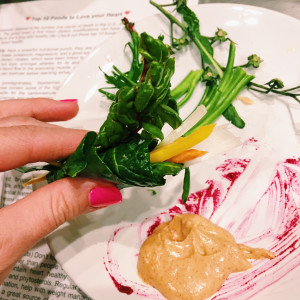Top 10 Foods to Love Your Heart
Recently I had the pleasure of joining natural foods chef and creator of DEFINE foods Erin Stewart in Houston to teach a Food From the Heart workshop. We created heart healthy bites and paired them with a little cardio-protective vino! Since February is heart health awareness month, I wanted to share some of the Top 10 Foods to Love your Heart!
Heart disease is the number one cause of death in the U.S., affecting more than 1 in 3 adults. The good news is that minor dietary modifications can have a profound impact on your ability to live a long and healthy life! Check out these heart healthy foods that can have a positive impact on your health!

1.BEETS: Pack a powerful nutritional punch, they are an excellent source of vitamin A and K, folate, potassium, magnesium, and a good source of calcium. Beets are naturally high in dietary nitrates, which have been linked to improved blood flow. Supplementing with beetroot
has been a hot topic amongst athletes for its ability to enhance performance through increased blood flow to the exercising muscle, allowing for an extended amount of time an athlete can exercise before reaching exhaustion. Ever tried a fudgy beet cake? Check out this delicious and nutritious Fudgy Beet Cake Recipe by natural foods chef and creator of DEFINE foods Erin Stewart.
2.BERRIES: (pomegranates, blueberries, strawberries, raspberries, cherries
) Berries contain some of the highest antioxidant levels, packing a powerful punch of benefits for the cardiovascular system. Berries are comprised of heart-promoting polyphenols and anthocyanins which act as free radical scavengers to fend off hardening of the arteries. Antioxidants act as the stable molecule that neutralizes free radicals to counteract cellular damage. While the body produces some antioxidants naturally, it relies on dietary sources (primarily fruits and vegetables) to deliver a healthy dose of antioxidant defense. More on the benefits of eating a diet rich in antioxidants here.
3.RED WINE: Red wine, or small amounts of any type of alcohol, may lower your risk for heart disease. However, keep in mind that consuming high amounts of alcohol, more than 1-2 drinks for women, and 2-3 drinks for men can actually increase your risk (1 drink is considered a 5 oz glass of wine, roughly 125 calories). Red wine and grapes contain cardio-protective antioxidants resveratrol and proanthocyanidins. Additionally, red wine helps dilate the blood vessels allowing more blood to flow to the heart. More info on heart healthy benefits of red wine here.
4.GREENS: (Swiss chard, collard, broccoli, spinach, brussels sprouts, kale) Green vegetables are high in carotenoids, an antioxidant which act as free radical scavenger and prevents the build up of potential harmful compounds. Dark leafy greens are also high in fiber, and loaded with vitamins and minerals! Studies show that approximately 1 in 10 Americans fall short on eating the recommended daily amount of vegetables and fruits. The antioxidants that come from green vegetables act as potent cancer fighters that ward off heart disease by protecting the narrowing or hardening of blood vessel function, and reduce the growth of fatty deposits on the vessel walls that become plaque over time. Try Erin’s deliciously simple Festive Spring Salad Recipe!
5.NUTS: (pecan, hazelnut, cashew, almond, walnuts) Don’t fear the fat! Studies suggest that people who consume nuts daily are leaner than people who don’t! Nuts are a nutrient rich, cardio-protective food that contain heart healthy nutrients such as unsaturated fats, fiber, vitamin E, potassium, and phytosterols. Regular consumption of nuts may lower cholesterol, reduce inflammation, help with weight management, and moderate swings in blood sugar. Nuts are a great source of protein, contain healthy omega-3 fatty acids, and are loaded with dietary fiber.
6.SEEDS: (sunflower, pumpkin, chia, hemp
) Seeds are high in soluble fiber, which is an important component for regular digestive health. A diet high in fiber helps naturally lowers cholesterol, stabilizes blood sugar levels, and makes you feel full longer. Many seeds are high in alpha-linoleic acid (ALA), a type of omega-3 fatty acid that helps lower the risk of heart disease. Seeds are also loaded with powerful vitamins and minerals which help boost the immune system. Check out this great chia seed pudding recipe.
7.SALMON: High in the polyunsaturated fat, omega-3 fatty acids (EPA & DHA), which may decrease triglycerides levels, lower blood pressure, and reduce the build up of atherosclerotic plaque. Omega-3 fatty acids are also linked to accelerated brain function, eye health, and assist with dry skin and hair. Salmon is a great source of lean protein. The pinkish red color in salmon contains a powerful antioxidant astaxanthin, which is part of the carotenoid family. We cannot produce astaxanthin ourselves, so we must rely on dietary intake. The American Heart Association recommends eating fish, especially fatty fish low in mercury content at least 2 times per week (serving size: 3.5 oz cooked).
8.SWEET POTATO: Sweet potato is one of the best sources of vitamin A, in fact one large sweet potato contains more than 100% of the daily recommended intake. Vitamin A is a power-house antioxidant linked to good eye sight, anti-aging, and a reduced risk for certain types of cancer. Sweet potatoes are also high in B5, B6, thiamin, niacin, riboflavin, and carotenoids. B6 is responsible for the break down of homocysteine, which a substance that contributes to the hardening of arteries and blood vessels. The potassium content of sweet potatoes also helps naturally lower blood pressure by maintaining the fluid balance of electrolytes. Sweet potatoes are also a great low fat food with a low glycemic index, which means they aid in slow steady release of blood sugar.
9.GOOD FATS: (olive oil, avocado, coconut oil
) Look for the good kind of fats like monounsaturated and polyunsaturated fats, and limit saturated fats to less that 10% of your total caloric intake. Avoid trans fats! Good fats promote cell development and regulate hormones, and have been linked to improved cholesterol levels. The high concentrations of monounsaturated fats present in olive oil are thought to lower low-density lipoprotein (LDL) cholesterol, increase high-density lipoprotein (HDL) cholesterol, and provide sustained blood sugar control. Research suggests that following a Mediterranean Diet, high in unsaturated fats, has been linked to a reduced risk of heart disease.
10.CACAO: Contains flavonoids called polyphenols which are a type of antioxidant that helps relax blood vessels, improves circulation, and lower blood pressure. Cacao may also help reduce bad LDL cholesterol and up good HDL cholesterol, as well as reduce inflammation in the body. Cacao is rich in magnesium
, which is important for muscle and nerve function, aids in bone and teeth development, and keeps the rhythm of the heart steady. Research also suggests that substance in dark chocolate
create the same euphoric feelings of excitement that you experience when you’re in love! Aim for at least 70% raw cacao, the darker the better!

Love chocolate? Try Define Foods tasty vegan Cacao Walnut Chip Protein Bars, use code KimsHealthyLife15 for 15% off your purchase!
Pictures from the DEFINE Food from the Heart Workshop!

Eat the Rainbow Crudité with Beet Hummus

Cacao Maca Truffle

Smoked Salmon Toast with Watermelon Radish, Horseradish, Beet, & Dill

Adobo Sweet Potato Bites with Pickled Onions & Avocado Crème

Thai Chili Salad Rolls & Spicy Almond Dipping Sauce



